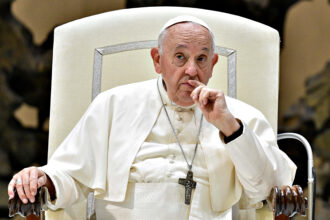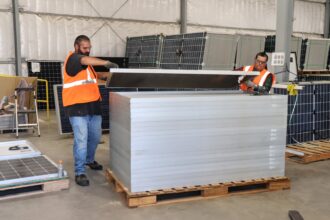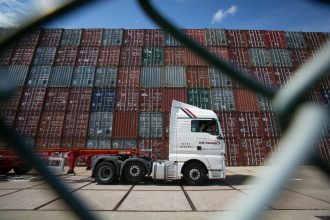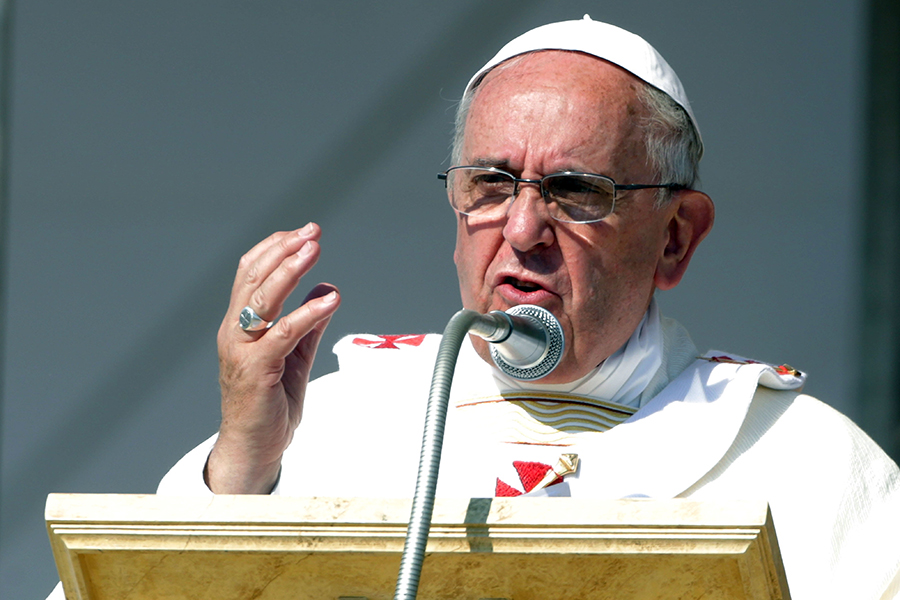Companies that want to do business in the European Union will soon have to pay extra if the carbon footprints of their products are too high.
The EU on Sunday officially began phase one of its carbon tariff. The first-of-its-kind tax scheme could help reduce the climate-warming emissions of industries that are notoriously hard to decarbonize, including cement and steel manufacturing.
Under the EU’s new policy, foreign companies must now report all the greenhouse gas emissions associated with certain imported goods: cement, steel, iron, aluminum, fertilizers, hydrogen fuel and electricity. Starting in 2026, any of those imports that don’t meet the bloc’s emissions standards will face an additional fee when crossing the border. Other goods will be considered for the tax in the coming years, the European Commission said.
The tax policy has drawn criticism from countries like China and Russia, which argue it undermines the principles of free trade and worsens geopolitical tensions. Supporters say the program is necessary to put EU companies on an even playing field with nations that have lower environmental standards. They also say it will incentivize industries to more quickly reduce their carbon emissions and encourage other countries to follow suit by adopting their own carbon tariffs.
The EU’s carbon tariff “is not about trade protection,” Paolo Gentiloni, the European economy commissioner, told Reuters. “It is about protecting the EU’s climate ambition and seeking to raise the level of climate ambition worldwide.”
By law, the EU must reduce its emissions 55 percent below 1990 levels by 2030.
The way a carbon tariff works is relatively simple. A company in China, for example, might sell relatively cheap cement, but with a high carbon footprint because the product is made in factories that run on electricity from coal-fired power plants. That puts EU cement makers, which are required to have lower emissions, at a cost disadvantage.
The EU company has had to invest extra money to switch to cleaner energy sources, buy carbon offsets and install more energy efficient equipment—meaning that, for now at least, it must sell its cement at a higher price. A carbon tariff essentially reduces the price differences between the domestic products and the more carbon-intensive foreign imports, incentivizing companies sending goods to the EU to reduce their emissions to avoid the additional fee.
Climate activists have long called on nations to adopt carbon tariffs, saying they’re a crucial tool in the fight to curb global warming. If enough nations adopt similar tax schemes, they say, even the companies and governments most resistant to calls for climate action could be forced to play ball.
In the United States, where climate policy has been highly politicized, the concept of a carbon tariff has recently emerged as a rare opportunity for bipartisan support.
While Republicans have generally opposed any new domestic taxes, some have now jumped on board with the idea of taxing the carbon emissions of foreign imports, seeing it as a way to give the U.S. a leg up on rivals like China.
Earlier this year, U.S. Sen. Bill Cassidy, a Republican from Louisiana, introduced a bill in Congress proposing a carbon tariff. Called the “Foreign Pollution Fee,” Cassidy said the legislation “would curtail China‘s ability to undercut U.S. manufacturers by penalizing China for not meeting the same reasonable environmental standards to which domestic manufacturers are held” and “level the playing field for American workers, making it less likely that jobs migrate to China.”
Democrats proposed a similar bill last year, called the “Clean Competition Act,” championed by U.S. Sen. Sheldon Whitehouse of Rhode Island. The Whitehouse bill, however, would also charge domestic companies a fee if their emissions exceeded the average for their industry, E&E News reported.
With the two parties still fighting over budget issues, including efforts by GOP lawmakers to cut climate related funding made available under the Inflation Reduction Act, it’s unclear how either of the carbon tariff proposals will shake out this year.
Still, there are signs that the idea is gaining support. In August, a group of bipartisan lawmakers introduced the “PROVE IT Act,” which would require the Department of Energy to study the carbon intensity of U.S. industries with the intention of informing a future carbon tariff.
“The United States manufactures and produces domestic goods and resources with some of the highest environmental standards in the world—far cleaner than many of our global competitors,” U.S. Sen. Lisa Murkowski, a Republican from Alaska, said in a statement announcing the bill. “I’m glad to join this commonsense legislation that will demonstrate to the world our environmental standards and promote the continuation of clean production.”
More Top Climate News
NYC Subway Flood-Protection Projects Are Behind Schedule, Audit Says: New York City is working to make its subways more resilient to climate-driven flooding. But a new audit from the state comptroller office, coincidentally released on the same day the city saw torrential rain that shut down several subway lines, found that some of the city’s flood resilience projects are behind schedule or over budget, Michelle Kaske reports for Bloomberg. Work to revamp part of the F line damaged by Superstorm Sandy, for example, didn’t start until 2020 despite a planned 2014 completion date.
Organizers Cancel Twin Cities Marathon Amid Record Heat: The U.S. Northeast isn’t the only region that saw nasty weather over the weekend. Unseasonably high temperatures paired with high humidity over the weekend forced organizers of the Twin Cities Marathon in Minnesota to cancel the event for safety reasons, Minnesota Public Radio reports. Temperatures hit a record 92 degrees Sunday, an exceptionally hot day for a Midwest October. Some 300,000 spectators and 20,000 runners were anticipated to attend the event—a major race in which participants can qualify for the Boston Marathon.
Treasury Warns of Climate Change’s “Substantial Financial Costs” on Americans: A new Treasury Department report warned that climate change is expected to impose “substantial financial costs” on U.S. households in the coming years due to severe flooding, wildfires and other extreme weather events that can drive up consumer prices, disrupt wages and damage property, Annie Nova reports for CNBC. It found that weather and climate disasters cost Americans more than $617 billion between 2018 and 2022—a record high for the country.
Today’s Indicator
41%
That’s the percentage of French citizens who support the idea of prohibiting people from flying more than four times in their lives as a way to address climate change, according to a new poll from the Consumer Science and Analytics Institute.

















